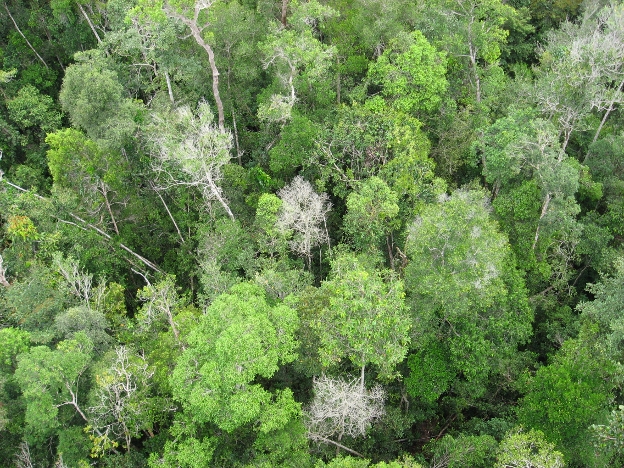Cookies
Van Hall Larenstein treats its customers' information with the utmost care and will never make this information available to third parties. Read more about us Privacy and Cookie Policy
Studies by two VHL University of Applied Sciences (VHL) researchers published simultaneously in authoritative journals
The future of tropical forests is uncertain due to climate change, but new research published in Science shows that they can continue to store large amounts of carbon if global warming remains limited. Scientists fear that rising temperatures will reduce this function because heat seems to limit tree growth and increase tree mortality. This will inevitably accelerate the effects of climate change.
Peter van der Meer, associate lecturer of Sustainable Palm Oil and Tropical Forests, is one of the co-authors of this research. “The research shows that tropical forests will eventually grow less rapidly under the influence of higher temperatures. This will reduce the buffering effect of tropical forests against climate change.”
An international team of researchers measured more than half a million trees in 813 tropical forests and 24 countries to see how much carbon is stored by forests under different climatic conditions. The results show that forests store less carbon under warmer conditions, especially above a threshold of 32 degrees Celsius. Trees store carbon as they grow, but in forests where tree growth is less than the tree mortality rate, they actually emit carbon.
Forecasts suggest significant carbon emissions at 2 degrees Celsius global warming, especially in the Amazon. However, tropical forests can continue to store significant amounts of carbon even under climate change, if they have time to adapt, if they remain intact and if global warming remains limited. The study warns that tropical forests may lose their carbon storage function. This situation may worsen if forests also experience more frequent and severe droughts.
Temperature has the greatest effect on carbon stocks because it reduces tree growth, followed by drought. The researchers conclude that tropical forests are capable of adapting to climate change in the long term, partly because of their high biodiversity levels. Tree species that are more resistant to the new conditions grow well and will replace species with less adaptability. However, forests must be connected to each other for this to happen.
The negative effect of heat and drought on carbon stocks in tropical forests can be partially mitigated by the stimulating effect that CO2 has on tree growth. In another study, published in Global Change Biology, the researchers use measurements from more than 5000 tree rings to see if recent CO2 increases have allowed trees to grow faster during hot or dry years. Lecturer of Forest and Nature Management Mart Vlam, co-author of this study: "We wanted to know whether tropical trees are more or less sensitive to drought when there is a higher concentration of CO2 in the atmosphere. This study has provided us with a number of important insights on this subject.”
Stimulating effects of CO2 on growth were found in cooler forests. For warm Asian forests (>25 degrees Celsius) they found just the opposite: CO2 increase led to greater heat and drought stress. WUR professor Pieter Zuidema, involved in both studies: “Together, these studies suggest that the future role of tropical forests in the global climate system will be determined by their response to heat, rather than CO2 increase.”
For further information, please contact Peter van der Meer, associate lecturer of Sustainable palm oil and tropical forests ([email protected], tel. 06 - 1285 5755) and Mart Vlam, researcher and lecturer in Forest and Nature Management ([email protected], tel. 026 - 369 5520).
Read the papers
